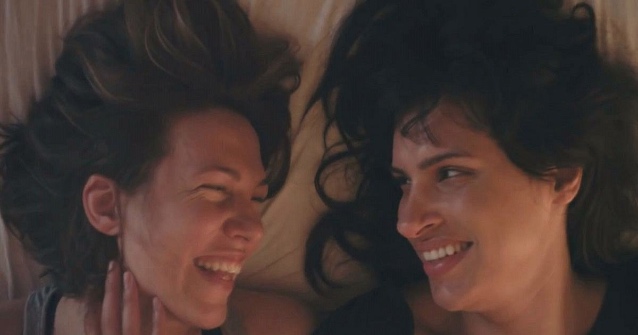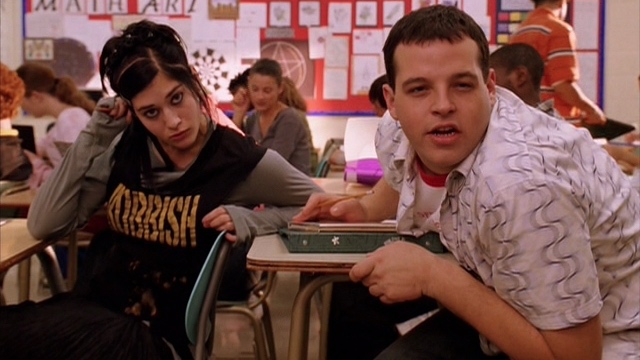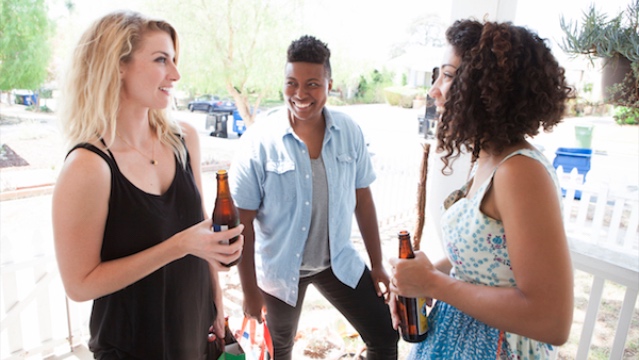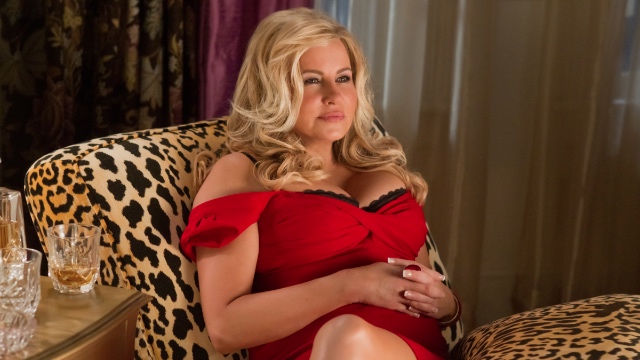
What does “queer” comedy look like? More importantly, what do we want it to look like? From 90s sitcoms to indie comedies to romcoms, comedians Brittani Nichols and Jess Beaulieu join submissions editor Mallory Andrews to discuss one-dimensional queer characters, elusive bisexuals, heteronormative tropes and moving beyond queer stories that focus on sexual identity. – the cléo editors
MALLORY ANDREWS: My introduction to queer comedy and my introduction to queer culture are one and the same. As a child of the ‘90s and an avid watcher of sitcoms, I remember seeing queer characters on Will & Grace or jokes about homosexuality on Frasier, etc. Queerness was almost always presented as the butt of jokes: funny ways of talking, funny walks (Jack on Will & Grace is most guilty of this, but it was also present in films like The Birdcage). But comedy also gave us Ellen [Degeneres]’ coming out, an event I remember very clearly. It was the first time the protagonist of a wildly popular sitcom was allowed to be openly gay…for a short time anyway, as the show was cancelled shortly after.
BRITTANI NICHOLS: I’d say from 2010 to 2012 was prime time for me latching onto queer comedies and comedians. I remember watching all of Liz Feldman’s web show This Just Out as a senior in college. Then, that summer, I saw Fortune Feimster on Last Comic Standing, where she told one of my favourite jokes of all time about coming out. Then I caught word of Wanda Sykes’ stand-up specials. I was going through a full-on personal comedy immersion program and it was nice to have lesbian comedians be part of that. As far as films, I Netflixed like crazy right after I came out. I wasn’t really looking for anything serious or sexy; I was just hungry for representation, so I naturally gravitated towards lesbian comedies, which are almost exclusively romcoms. Movies that stuck out for me were Puccini for Beginners (2006), The Kids are Alright (2010), Imagine Me & You (2005) and Saving Face (2004).
JESS BEAULIEU: I do recall being a young kid and wondering what it meant when I heard that Ellen was “coming out.” I thought “Coming out of…what? Was she trapped somewhere?” I grew up Catholic, so gay, lesbian, bisexual, transgender and queer were not words we discussed in my household. Ellen proudly declaring she was a lesbian was quite “shocking”—back then, there were way fewer queer celebrities divulging that information to a mainstream audience. It’s surreal to think about a time when Ellen wasn’t as open about her sexual identity, considering how outspoken she is about queer issues and gay rights today. I genuinely don’t think I met an “out” queer person until university, and I didn’t understand or recognize my own queer desires as a teen, so my exposure to queerness was via TV and film. Will & Grace was definitely a staple. I remember watching Cruel Intentions (1999) in high school and being so turned on when Sarah Michelle Gellar and Selma Blair kissed. I still am currently.

MA: Jess, it’s funny you mentioned being confused by what it meant for Ellen to “come out.” I remember when the episode aired asking “What does gay mean?” and someone—I assume a grown-up—saying “It means happy!” And I thought, “No…I don’t think that’s how they mean it.”
I’m glad you brought up comedians, Brittani, because Margaret Cho was one of my formative queer influences. I watched her fairly tame sitcom All-American Girl and was inspired to seek out her far raunchier comedy albums (much to my shock at the time). Along with Cho’s frankness about sexuality, I was also interested in her way of articulating fluidity. She talks about sleeping with men and with women, which she hilariously chalks up to “sluttiness.” Bisexuality still seems more difficult to find on-screen. That’s one of the reasons I loved Desiree Akhavan’s character in Appropriate Behavior (2014), a Persian-American woman who comes out to her family as bisexual. Which is telling—in order to finally see a bi protagonist, we needed a bi writer/director.
BN: I think it’s a blessing and curse that in order for more comedies about queer women to be made it will have to be the direct effort of queer women. Straight romance is so intertwined with the comedic formula that I think big budget movies consider it too much of a risk to do something like make a lead gay. [Ed note: In a recent interview about Ghostbusters (2016), director Paul Feig acknowledged Sony’s reluctance to allow Kate McKinnon’s character to officially be gay.[i]] And when you look at the people writing big budget comedies who have access to that world, it’s overwhelmingly straight white guys. Studio movies and bigger indies tend to hinge on what talent is attached, so what would probably help most of all would be some blockbuster actress demanding that the character be queer, or A-list lesbian actresses attaching themselves to scripts with queer characters.
JB: In response to Mallory, bisexuality and pansexuality were definitely missing in film and TV throughout the ‘90s and into the early 2000s. Bisexuality was this terrifying word that no one used or believed in, and pansexuality wasn’t even in the queer lexicon yet. There was/continues to be such a binary, rigid understanding of sexuality. I remember watching the film The Object of My Affection (1998) as a teenager, a movie where Paul Rudd’s character is gay and Jennifer Aniston’s character is straight and in love with him. There’s a scene where they almost have sex but then don’t, and soon after Paul Rudd’s character returns to only sleeping with men. When they were kissing, I also remember thinking “He can’t kiss her! He’s gay! Duh!” You can interpret that scene in so many ways, and I don’t want to try to define that character’s sexual identity…. However, it was unheard of 20 years ago to have a story about someone who was into both men and women, or on a queer spectrum. It was gay or straight and nothing in between, and if situations ever came up where a character was “tempted” by a gender they’re not typically attracted to, they were “confused.” It was fleeting. Not a real desire.
MA: That kind of thing drives me crazy. Same scenario with Willow on Buffy the Vampire Slayer—she was straight until she was gay. No nuance, no consideration of fluidity. She just woke up one day attracted to a woman and “poof,” she’s immediately a lesbian, despite having what was presented as a very satisfying physical relationship with her high school boyfriend—which plays into the straight-comedy formula that you mention, Brittani. The rules of these formulas are so stringent, and the (nominally white, cisgender male) people who make big-budget comedies have no reason to want to explore outside their heteronormative worldview, so there’s little room for queerness, both in terms of sexuality, and of queerness in the more academic sense of fucking with and critiquing the “normal” way of doing things.

JB: I’ve noticed that if a straight person writes a film or a TV show that includes a queer character, they don’t tend to be layered individuals—their main trait is that they’re queer. You don’t learn anything about them beyond who they love and have sex with, which is so disappointing. Or they’re simply stereotypes constructed from the straight gaze. Mean Girls (2004) comes to mind: Cady’s friend Damian, who is a gay teenage boy, is 100% support and comic relief and does not advance the plot at all. His queerness was purely used to get laughs, and there is also an ongoing joke where Regina George calls Janis Ian a “lesbian” and the film treats this as somehow an insult. That interaction alone reveals the heteronormativity of the film. Janis Ian actually makes a speech at the end of the film where she basically mocks being a lesbian and uses offensive language. Maybe instead of teaching kids that you need to defend your “straight” identity, we should teach them that being queer is never a negative. Mean Girls perpetuates the fucked-up notion that being white, straight and cisgender is the norm and those who possess this identity are the ones whose stories should be told.
I completely agree with Brittani that it is a blessing and a curse that funny, authentic, quality comedies have to be made mostly by queer people. I think that we need to be elevating the voices of queer filmmakers, and queer WOC in particular, and providing a platform for marginalized people to create/market/share art. But, as a queer content creator, I write straight characters who aren’t one-dimensional, who contribute to the plot and have something valid and hilarious and interesting to say. Why can’t they do the same for us?

BN: Women are written terribly all the time, so it’s no surprise to me that queer women fare so poorly. And when that gets addressed, which is rarely, it’s attributed to sexism/misogyny or not being in touch with the female experience (whatever the hell that means). We need to just call it what it is: if you can’t make a human being seem like a complete person regardless of their sexuality, gender, race or anything else, you’re a bad writer.
JB: Totally, and straight white dudes use this idea of “not being in touch with the female experience”—not understanding how a woman could possibly think or feel or behave—to opt out of including any female main characters. They act as if they have never encountered a woman in their life.
MA: I’m conflicted on this point. On one hand, it’s absolutely a symptom of bad writing (and, to be harsh, a lack of empathy) if a non-queer creator is unable to convincingly portray queer characters as fully-rounded human beings. But there are vagaries of being a woman, or being gay or trans, that only people in those communities may be able to accurately articulate, simply by virtue of having lived those experiences. I’ve always been uncomfortable with the screenwriting “advice” that to write a well-rounded female (or queer) character, just write them as you would a (straight) man. But I’m speaking from the outside as a critic, and not as a screenwriter, so maybe this is a useful strategy?
BN: Absolutely. My point isn’t meant to undermine the value of LGBT people and POC telling their own stories. I’m just saying if you’re going to choose to include us in a narrative, the least we can expect is to seem like a fully formed person, which doesn’t always happen.
JB: It’s complicated. That advice is problematic but also incredibly helpful for those who have been programmed by society into thinking that women aren’t people—that, as Brittani said, we are only our gender. Meanwhile, men are complex. But I’m not going to say that a woman’s experience isn’t different than a man’s experience. The art that I create is for women to enjoy—that’s my agenda. The characters I write are women, the stories I tell are about women, and the writers and actors I work with are women who possess identities different from my own, because intersectionality is necessary.
I’d still like to see more queer representation in mainstream Hollywood cinema and fewer straight white dudes leading the charge in every department. I think a good way to use your power as a privileged person in entertainment is to produce for others. Hire female filmmakers and queer writers and have POC in front of the camera and behind. Leonardo DiCaprio speaks a lot about using film to better the world, but I wish he would quit starring in movies and start producing some for those whose voices haven’t previously been heard. I’d like him to put his money where his mouth is.
BN: But this does make me think about what constitutes a queer film. Is it enough that the character happens to be queer, even if that doesn’t factor into the plot at all? How many characters have to be queer in order for it to be a queer movie? If every movie started to have a queer character in it but the leads were always still straight, would that feel better?
JB: Since there is usually one main protagonist in film, I would say a queer film is one where a queer character’s story is at the forefront. That’s my definition. They have an arc, they go on an emotional journey, we get to know them deeply and they affect the plot. They’re in numerous scenes in which they speak a lot. They aren’t just secondary best friend characters who pop in to crack a joke, give advice and peace out.
BN: I agree with that assessment, but I can’t name many queer movies where identity isn’t used as a foil for the main character. Either a lesbian wants to date someone who’s straight, or a character is coming out. Now is that because people aren’t making movies that don’t hinge on these tropes, or—if they are making them—those films aren’t the ones rising to the top? I don’t know. But I’d like to see more lesbian comedies where sexuality isn’t necessary for the film’s synopsis.
JB: Totally, Brittani—completely agree. I do think that if we’re talking specifically about romantic comedies, romantic relationships are going to be the main focus of the film. But I’d like to see queer folks being given more opportunities to make movies about whatever they want, not just their sexual identity. Of course if they want to do that, great! I’m a sucker for a solid romcom, especially a queer one—I love love, and I love sex even more. But the hope is that with progress there will be more variety in cinema.
BN: Sure, but where are the non-romcom comedies? And why can’t there be a lesbian romcom where everyone is already out? I’ve never had to watch Hugh Grant come to terms with his sexuality as part of the story. [Ed note: Good point, but it could be argued that coming to terms with heterosexuality is the subtext of every one of Hugh Grant’s films, lol.]
JB: Yup. Lots of shame and struggle and sadness imbedded in queer romcoms for sure, and that’s usually because the character hasn’t “come out” to whomever they fear may judge them. Meanwhile, straight comedies are allowed to be celebratory and fun. I’d love to see a slapstick adventure buddy comedy with four queer women taking a road trip to literally anywhere.
MA: If we’re defining queer film as a film that features prominent queer characters, I also think it’s important that their arc doesn’t use their sexual identity in a dramatically manipulative way. Queerness in dramas tends to play up the tragedy of a character’s identity being misunderstood or actively discriminated against. I’m thinking along the lines of Boys Don’t Cry (1999)—though it’s telling a true story, it’s a queer story filtered through a usually straight genre to appeal to a straight audience. This is why I sometimes think comedy is perhaps one of the best vehicles for portraying queer characters and stories, if comedy is about exploding and complicating boundaries. I like Jess’ idea of a queer road trip comedy that’s just four women on the road. Brittani, what’s been your experience as a producer of queer comedy? Is there an expectation to be representative of queerness in some kind of official capacity?

BN: When the story doesn’t hinge on identity, people do see it as an opportunity to get rid of the gays. I’ve had someone ask me if I could change a show to be about straight people instead, and I’ve had to add a scene to a pilot so there could be a straight guy in it. I think for me, personally, there is a pressure of, “is this ‘gay enough’ and ‘black enough’?” There’s this vibe that in order for something to be queer or black there needs to be some element of struggle to it that specifically involves those things, and I’d like to move away from that in my own filmmaking. I think those stories won’t ever stop being made—nor should they be—but we need more creators that want to tell stories that are informed by those specific points of view, rather than depending on them.
Mallory Andrews is the Submissions Editor for cléo and a columnist for Movie Mezzanine.
Brittani Nichols (Transparent, Words With Girls) is a Los Angeles-based comedian that co-hosts Hamilton the Podcast and Brand New Podcast. She wrote/produced/stars in Suicide Kale, a lesbian dark comedy that’s currently playing film festivals.
Jess Beaulieu is a comedian, writer and actor who hosts the weekly feminist podcast The Crimson Wave.




